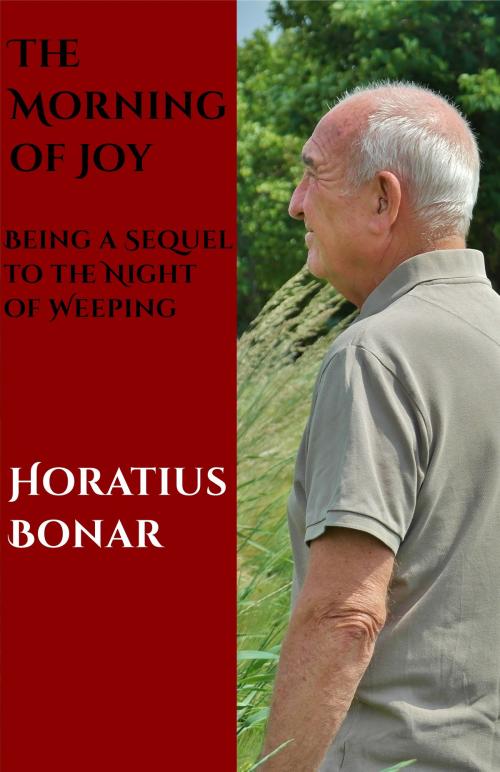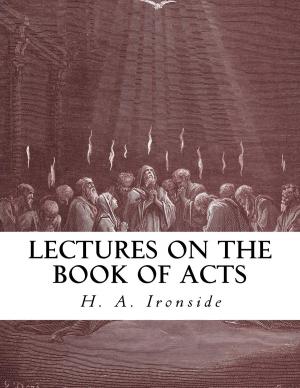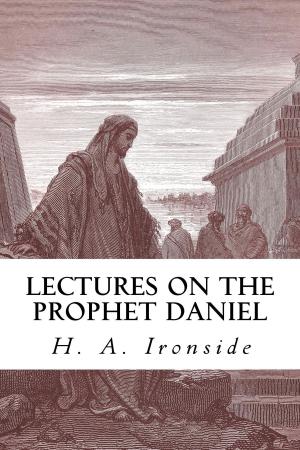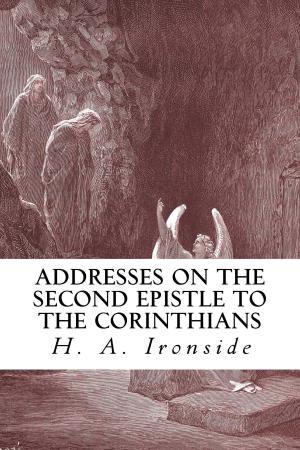The Morning of Joy
Being a Sequel to the Night of Weeping
Nonfiction, Religion & Spirituality, Christianity, Christian Literature| Author: | Horatius Bonar | ISBN: | 1230001943139 |
| Publisher: | CrossReach Publications | Publication: | September 29, 2017 |
| Imprint: | Language: | English |
| Author: | Horatius Bonar |
| ISBN: | 1230001943139 |
| Publisher: | CrossReach Publications |
| Publication: | September 29, 2017 |
| Imprint: | |
| Language: | English |
I HAVE been asked, once and again, to follow up “The Night of Weeping” with “The Morning of Joy,” the words of David, in the 30th Psalm, having suggested the addition. After much thought and some hesitation I have done so.
The former work was meant to be complete in itself, presenting not merely the night-side of tribulation, but bringing out also, though less prominently, some of its day-hues. As, however, it has been thought incomplete, having in it so much more of night than of day; an endeavour has been made to complete it by drawing forward the eye to the scenes of morning, so soon to open upon us, in all their breadth and beauty. In this way we are led to forget the things that are behind, and to reach forward to those before, pressing towards the mark for the prize of our high calling. And the fuller, the truer, the more frequent our anticipations of promised glory are, the deeper and the richer will our consolations be.
Sitting down beneath the shadow of the cross, and reading in its inscription God’s record of free love, our fears are put to flight and our souls find rest. Possessed of forgiveness and assured of the life that dies not, we feel that all is well with us. “Come life, come death,” we can say, “come calm or storm, come gain or loss, come joy or grief, all is well.” For “the work of righteousness is peace, and the effect of righteousness quietness and assurance for ever.”
And surely this is much in the way of consolation, even though we had nothing more to cheer us. But it is not all. There is much more than this.
While sitting there God opens upon our eye a wide prospect, stretching far into eternity. Perhaps he sends trial, “breaking us with his tempest.” Then he spreads out before us the vision of brightness for our comfort, and as the grief presses heavier, the vision enlarges on the view. The going down of our sun, though it covers earth with a shadow, draws the curtain from the firmament above us, and encircles us with the splendour of ten thousand stars. Then we not only are led to see that the greater portion of our being lies beyond either present joy or sorrow, but are also led to inquire into those outlying hopes, and to survey the whole breadth of that goodly inheritance, of which we are the heirs.
These inquiries and surveys are, as we shall see, most blessed in their nature, and purifying, as well as comforting, in their tendency. They are fraught with holiness and full of joy. They tend to make us forget the present in the future, and to assimilate us to the objects thus vividly presented to us. For, though it is true that “tears make the harvest of the heart to grow;” yet it is the anticipated light of the unrisen morning that ripens it.
I HAVE been asked, once and again, to follow up “The Night of Weeping” with “The Morning of Joy,” the words of David, in the 30th Psalm, having suggested the addition. After much thought and some hesitation I have done so.
The former work was meant to be complete in itself, presenting not merely the night-side of tribulation, but bringing out also, though less prominently, some of its day-hues. As, however, it has been thought incomplete, having in it so much more of night than of day; an endeavour has been made to complete it by drawing forward the eye to the scenes of morning, so soon to open upon us, in all their breadth and beauty. In this way we are led to forget the things that are behind, and to reach forward to those before, pressing towards the mark for the prize of our high calling. And the fuller, the truer, the more frequent our anticipations of promised glory are, the deeper and the richer will our consolations be.
Sitting down beneath the shadow of the cross, and reading in its inscription God’s record of free love, our fears are put to flight and our souls find rest. Possessed of forgiveness and assured of the life that dies not, we feel that all is well with us. “Come life, come death,” we can say, “come calm or storm, come gain or loss, come joy or grief, all is well.” For “the work of righteousness is peace, and the effect of righteousness quietness and assurance for ever.”
And surely this is much in the way of consolation, even though we had nothing more to cheer us. But it is not all. There is much more than this.
While sitting there God opens upon our eye a wide prospect, stretching far into eternity. Perhaps he sends trial, “breaking us with his tempest.” Then he spreads out before us the vision of brightness for our comfort, and as the grief presses heavier, the vision enlarges on the view. The going down of our sun, though it covers earth with a shadow, draws the curtain from the firmament above us, and encircles us with the splendour of ten thousand stars. Then we not only are led to see that the greater portion of our being lies beyond either present joy or sorrow, but are also led to inquire into those outlying hopes, and to survey the whole breadth of that goodly inheritance, of which we are the heirs.
These inquiries and surveys are, as we shall see, most blessed in their nature, and purifying, as well as comforting, in their tendency. They are fraught with holiness and full of joy. They tend to make us forget the present in the future, and to assimilate us to the objects thus vividly presented to us. For, though it is true that “tears make the harvest of the heart to grow;” yet it is the anticipated light of the unrisen morning that ripens it.















